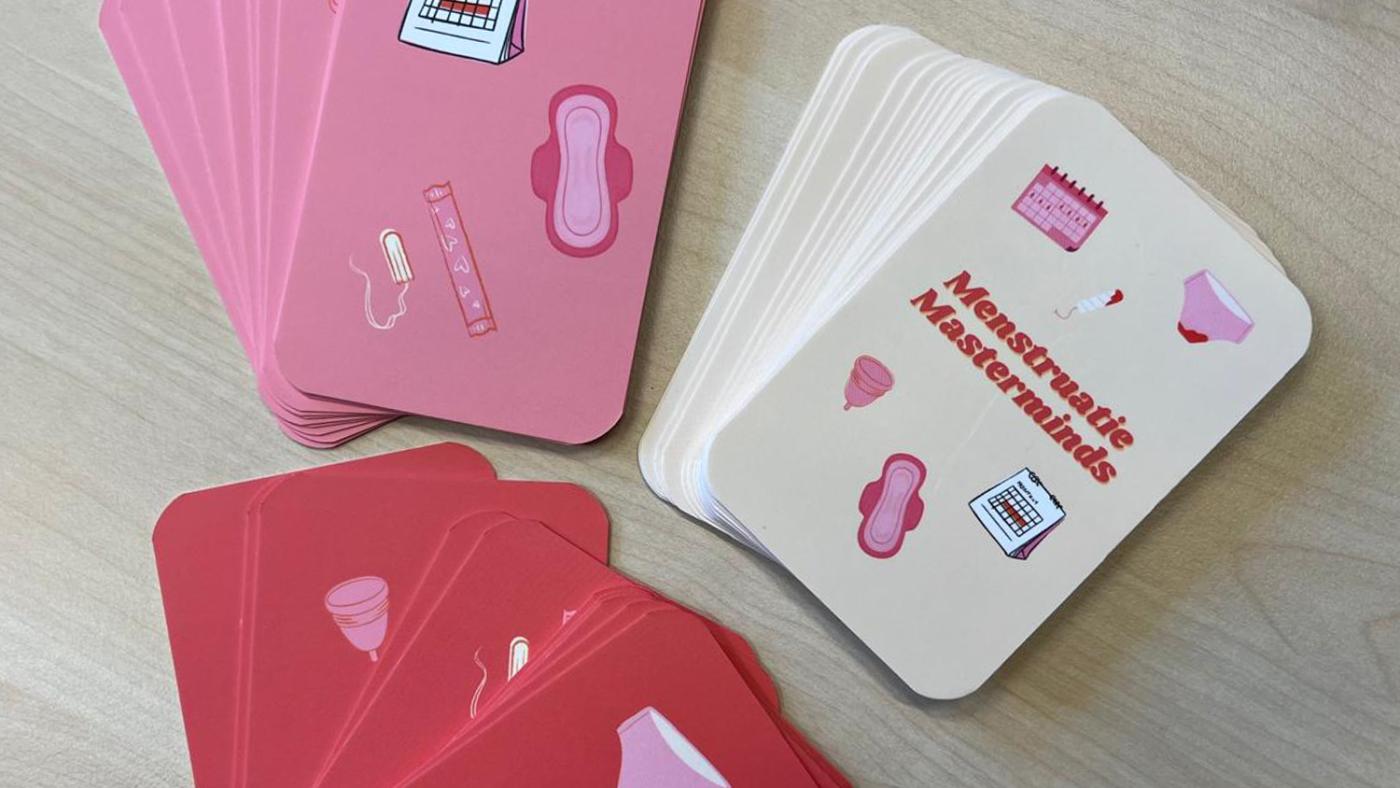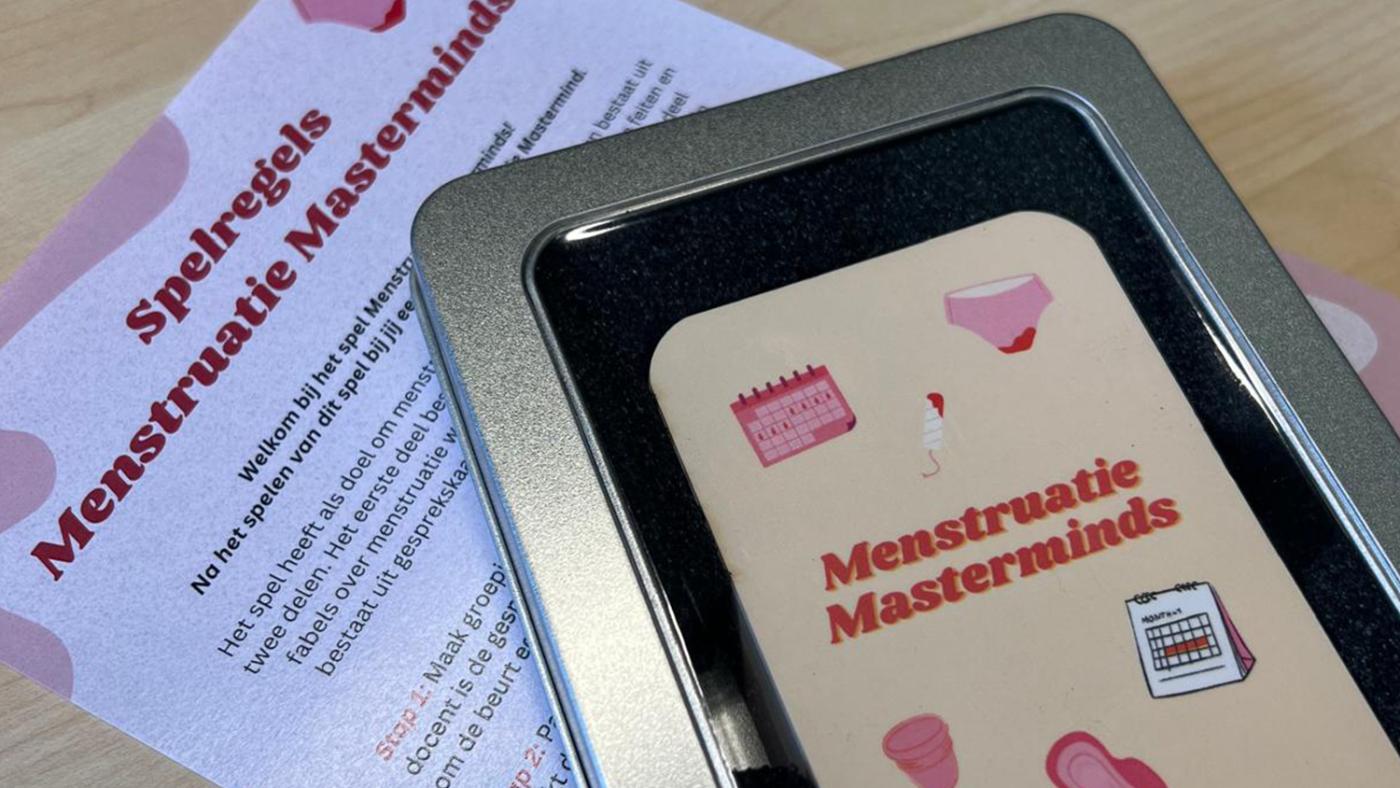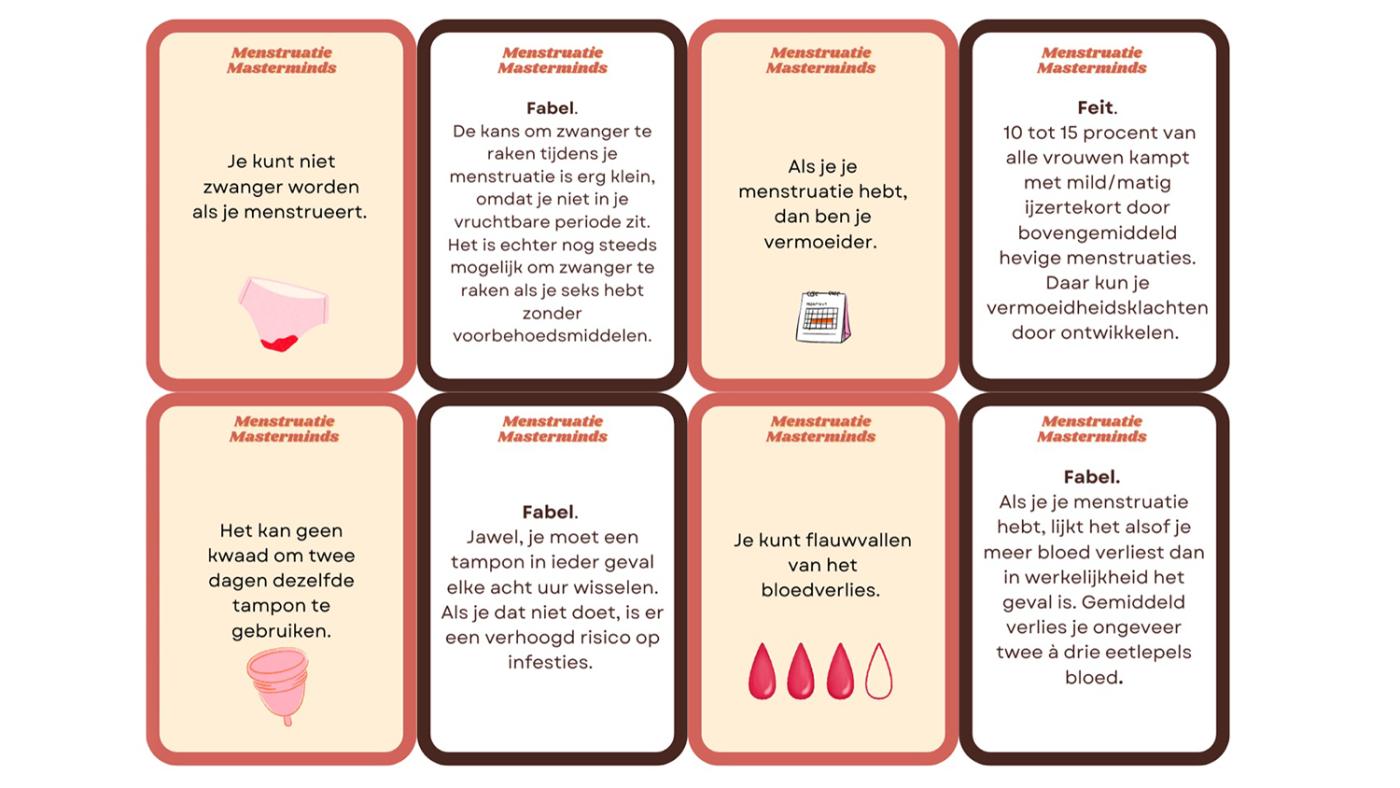‘Many people still think periods are dirty’
Students create game to break menstruation taboos

Last year, five students from the Master’s in Public Management were assigned to devise a creative intervention for a local social issue. Julian Allemans Hartog, Celine Verhoeks, Elsemieke Hack, Eva Vermeulen and Emma Pullen sunk their teeth into this challenging task and came up with a game for young people that starts a conversation about periods and period poverty. It's called "Menstrual Masterminds."

Emma (22), who now works as a researcher at UU, explains how the idea came about. “The assignment was very broad, so we started reading local news reports. Soon, we came across an article about period poverty in Overvecht. Young women are not always able to buy sanitary pads or tampons and they have difficulty talking about that. As a result, they sometimes skip school or miss social interactions because they are on their periods. with friends. But it's not just a matter of financial distress and feelings of shame – menstruation itself is a taboo. We wanted to know more about that.”

Julian Allemans Hartog

Celine Verhoeks
Research on period poverty
The students talked to Overvecht residents about this topic. They visited secondary schools, food banks and the so-called Mups (sanitary pad distribution points). "Oftentimes, the cupboards at the Mups turned out to be empty. The moment the products are refilled, they are gone in no time, which confirms there is a lot of demand for these products,” says Emma.
The research into taboos surrounding menstruation was a little bit more difficult. “It helped to talk to mothers from the neighbourhood and analyse literature and current news reports. We found out that many people still consider periods dirty, even though it's a very common thing. In addition, many of the girls we spoke to don’t dare to admit that they find pads and tampons expensive and can’t always afford them.”

Elsemieke Hack

Eva Vermeulen
Development of innovation
After the initial investigation, the students started brainstorming interventions. Their first idea was a package containing menstrual products and a brochure with information about period poverty. Even the game idea has been refined. Its first version had "true or false" cards so that players could discuss the topic with each other. Emma: “We tested our ideas on other students first. Initially, we didn’t expect most people to prefer the game, but it turned out to be more useful to tackle the taboo than just offering products. There are already a lot of initiatives offering menstrual products, such as Mups. Besides, sanitary pads and tampons are available in the toilets of many schools. The game offered something new: a means to start a conversation and break the taboo.”

Emma Pullen
After the game was approved by fellow students, Julian, Celine, Elsemieke, Eva and Emma went to a secondary school to see what the pupils there thought of the game. This led to meaningful conversations, which made them realise that many young people also tend to perceive periods as dirty. “In the second and third grades, Biology covers a few things about menstruation, but those lessons are mainly about reproduction and bodily functions. Many teachers don’t realise that menstruation is an issue in itself and how important it is to talk about it with the pupils. For example, not everyone knows how long you can wear a tampon or if you can swim while on your period. Many also have doubts about the safety of menstrual cups.”
Facts, Fiction and open conversation cards
In the first version, the game consisted of cards with statements and players were invited to discuss whether they were facts or fiction. For example: "You can wear a tampon all day" or "Menstrual cups are safe, cheap and good for the environment."
After the high school test phase was completed, the game was developed further with separate cards for boys and girls. It also has two rounds. “We noticed that it works better when girls and boys talk separately in the first round", explains Emma. "Girls were looking for recognition and a safe atmosphere to share experiences, such as who uses which products, how to handle hygiene, and the risk of pregnancy while on your period, while guys wondered how to deal with their sisters when they are on their period, how they feel about it, and what they can do to support them. In the second round, boys and girls come together to talk to each other. That combination works really well.”

The game also includes open conversation cards. Emma: “There was a need for open questions, like 'Do you tend to stay home when you’re on your period?' for girls and 'Do you know how often girls get periods?' for boys. Facts and fiction cards are nice, but there is always a clear answer to them, so the conversation is a bit shorter. Asking open questions leads to an extensive, personal exchange.”
Emma observes that a safe atmosphere is crucial for such a conversation, which is why the UU students added a lesson plan aimed at teachers to the game. “Teachers can play a major role here. A well-informed teacher who understands the importance of the game and can talk to the students at their level is key. Our presence was nice too because we still fit in the age group relatively well.”
Positive effects
Both students and teachers responded positively to the game and indicated that they benefited from the substantive information and the open conversations. Emma: “The beauty of the game is that it reaches both boys and girls. Boys can also benefit from a broader understanding of what menstruation entails. They can work on smashing stereotypes and reducing stigmatising comments. Not every young woman who is having a bad day is on her period but, if that person is on her period, she will benefit more from support than a nasty comment.”
The students themselves also had a great experience. “I’ve learned that it’s crucial to immerse yourself in the target group and not be limited by your own frame of reference. You can do that by engaging in conversations and getting to know your target group deeply. In addition, I have seen how beautiful it is to come up with creative solutions to public issues. I am positively surprised by how we could come up with such a nice, impactful intervention in such a short time.”
The future
Most of the game's designers have graduated by now, but Menstruation Masterminds is still in full swing. Julian, Celine, Elsemieke, Eva and Emma still approach different schools by emailing or visiting them, taking the time to talk to pupils about the game, how it was created and its goal. “We always go into those meetings with a positive attitude, without pointing fingers. We stress that the game is accessible, does not take too much time and can be integrated into a lesson to reduce the pressure on teachers. We hope that the game will be played many times and that the taboo on menstruation and period poverty will become smaller and smaller.”
Would you like to learn more about the game or receive a copy? Please contact Emma Pullen at e.r.pullen@uu.nl.